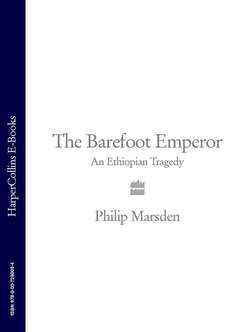Читать книгу The Barefoot Emperor: An Ethiopian Tragedy - Philip Marsden - Страница 22
Оглавление10
Several months later, on 27 December 1856, the Coptic Patriarch Cyril IV – spiritual father of the Ethiopian Church – rode into Gondar. He had travelled for months from Alexandria. His men ran ahead of him, through the stony streets of the old capital, in and out of the juniper shadows, shooing all women from the slightest possibility of meeting his gaze.
The patriarch’s journey to Ethiopia was one of the most significant moments of Tewodros’s early reign. Cyril turned out to be the highest-ranking foreigner ever to reach the emperor, and his visit forced the imperial hand in his initial choice of overseas allies. It also revealed in public for the first time the extremes of Tewodros’s personality.
It began well enough. Tewodros received His Holiness in Debre Tabor with great ceremony and genuine deference. But as the days passed the emperor began to spot blemishes in the heavenly mantle of the primate. He heard Cyril’s muttering about his daughter Church, the inappropriate worship of the cross and of the saints, about how full the Ethiopian calendar was of fast days and holy days. For a man whose thoughts seldom strayed from matters of the spirit, the patriarch also appeared very keen to inspect the imperial forces. At the same time Tewodros received reports that Egyptian war-camels were gathering on his western border, and that Said Pasha himself, viceroy of Egypt, was in the Sudan. Suddenly all became clear to Tewodros – the patriarch’s visit was a ploy by the pasha to check Ethiopia’s weakness before invading. What should he do?
Tewodros imprisoned the patriarch. He locked him up in a house with his bishop Abune Selama and placed a hedge of thorns around it. During the days that followed, loyalties polarised sharply. Many Ethiopians were horrified at Tewodros’s sacrilege, and were quick to blame the other foreigners, the European Protestants. In turn, Tewodros turned to his ‘children’, Plowden and Bell, for support, and they saw a chance to press for a direct approach to Queen Victoria and Britain.
But the suggestion angered Tewodros. ‘Do you suppose me capable of fear, that I would use such a moment?’
‘I don’t believe the pasha would ever become the aggressor in the face of our protests,’ stressed Plowden.
Tewodros clung to his belief in the Protestants. With the Copts still imprisoned, he stood in court one day trying to explain his stance. Pointing to a pair of Protestant missionaries, he addressed the sceptics: ‘They seek our welfare, and have brought us Bibles and Testaments in our own language. But the holy father has come as a merchant and ambassador, asking us for wax and ivory and mules and zebal, and for friendship with the Mohammedans.’
He reminded them of the urgency and integrity of his own mission. ‘I am Christ’s servant. He gave me victory over all my enemies. I am labouring for His honour, to protect our Church against Muslims.’
They should trust him as their leader. ‘As long as I have life, I will keep down the patriarch, the abun and Said Pasha – even the Queen of England, should she help him.’
Yet between Tewodros’s suspicions and the detained churchmen, his people had made their choice. Both Tewodros and his Protestant friends found themselves marginalised.
Some days later, the emperor called a much larger assembly – courtiers, ministers, missionaries, foreigners. A thousand priests and debteras joined them, thousands more of his own troops. This time he stood before them not in defiance, but to confess: it was the devil who had made him abuse the churchmen in this way. He sent a message to the thorn-rounded house, pleading for reconciliation. When it was granted, he went to kneel before the patriarch and the abun and begged their forgiveness.
Before returning to Egypt, Cyril IV left a tiny seed to take root in Tewodros’s mind. Europeans, he said, were not to be trusted, their motives were selfish. Earlier he had urged Tewodros to expel the Protestants. Now he told the emperor quite plainly that the English merely wanted his friendship in order to ‘undermine his power and conquer his country’.
At the time Tewodros refused to believe it. But in years to come, as he tried to understand the ambiguous signals of British diplomacy, he often found cause to recall that patriarchal warning.
